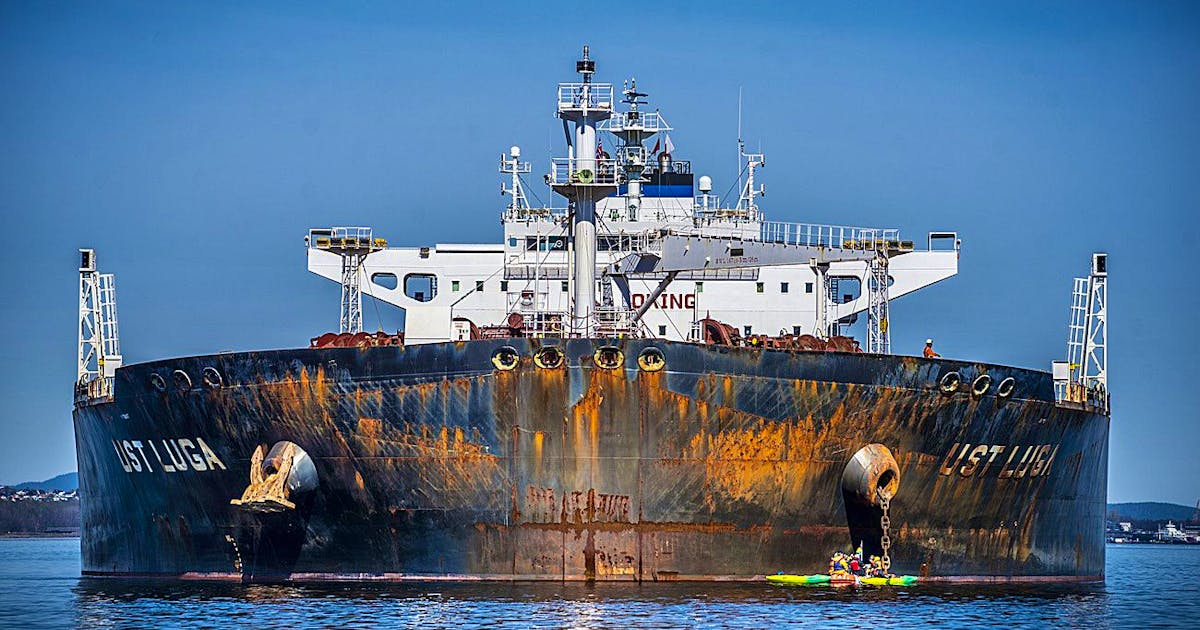

Build:
Keystone
Trade in recognized Russian oil is thriving in the Baltic Sea. Outdated, pilotless and rusting cargo ships make it to the world's oceans, endangering shipping and the environment at the same time.
No time? Blue news in a nutshell for you
- It sounds like something out of a disaster movie: ancient oil tankers navigate treacherous straits without pilots, endangering people and the environment.
- As Danish investigative media Danwatch and ZDF report, it has been part of everyday life in the Baltic Sea since the outbreak of war in Ukraine.
- Since the introduction of sanctions on Russian oil, the number of oil tankers leaving the Russian ports of Ust-Luga and Primorsk under suspicious flags has increased sharply.
- Tankers have to manipulate their ship data and give up the valuable experience of Danish pilots. According to Voices of Denmark, a “ticking time bomb”.
The waters between the Danish islands of Dars and Falster are known for their treacherous nature. Shallow water depths, sandy banks and strong currents pose problems for captains. To navigate the strait efficiently, Danish pilots come on board for a fee and advise the navigator. Thanks to their excellent knowledge of the water, they ensure greater safety on board.
However, since the outbreak of the war in Ukraine, this privilege has been used sparingly. The reason: Many of the oil tankers on this route are part of the Russian Shadow Fleet, which carries goods sanctioned to the world's oceans via the Baltic Sea. You navigate at your own risk, thereby risking shipping and the environment. This is the “Daily newspaper» Citing the Danish Investigative Media Agency Dawnwatch.
“Ticking Time Bombs”
Apart from refusing to bring experienced pilots on board, sea giants are also worth noting because they are ready for scrap. Many ships are outdated, poorly maintained and rusted. Nothing more than a “ticking time bomb,” according to Martin Lidegaard, head of the Danish Social Liberal Party.
how ZDF As already revealed last year, the Baltic Sea has become a major exchange point for banned black gold since the introduction of sanctions on Russian oil. Putin's shadow fleet parades in the Gulf of Finland in St. Petersburg. A mishmash of old tankers constantly renamed and sailing under different flags.
Their goal: to transport Russian oil from the ports of Ust-Luka and Primorsk through the Baltic Sea to the world's oceans, and then sell it in China, India or Turkey.
Environmental damage and questionable insurance
Every effort should be made to conceal the appearance of the goods. According to the ZDF, ships falsify data about their routes and cargoes loaded, and switch off transponders. Additionally, they can rarely be inspected or maintained because they sail under the flags of states such as Gabon or Eswatini, known for questionable shipping regulations.
Water pollution occurs during so-called “ship-to-ship transfers,” in which oil is pumped from one ship to another in international waters to falsify its origin.
Particularly troubling: According to Dawnwatch, the Russian-based insurance company behind the ghost ships is also questionable. Contracts should contain a disclaimer clause, according to which the insurance company does not have to pay out in the event of an accident. In the event of an oil spill, cleanup costs are borne by the countries bordering the accident site.

“Wannabe pop culture fanatic. Zombie advocate. Entrepreneur. Internet evangelist. Alcohol fanatic. Typical travel buff.”




More Stories
User Insights on Using Slot Winner APK Effectively
Choosing the Right Quality Management Software for Your Industry
Astronauts will be stuck in the ISS for months